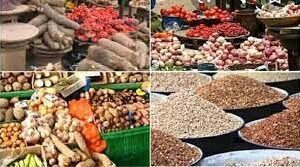Recent international commitments for action, including the Paris Agreement on Climate Change, which Nigeria has assented to and the 2030 Agenda for Sustainable Development both recognise the role of sustainable agriculture in addressing climate change, hunger and poverty especially in third world countries like Nigeria. Marking the 2016 World Food day in Abuja, stakeholders in Nigeria agreed that climate change, hunger and poverty must be addressed together in order to be able to feed the nation in the future, John Oba, was there for Blueprint.
Experts finding has shown that climate change are already undermining the health of soils, forests and oceans on which agricultural sectors and food security depend. In Nigeria deforestation, desertification and flood are common occurrence across the country.
The Food and Agricultural Organisation (FAO) recently stated that climate change, hunger and poverty must be addressed together in order to achieve the sustainable development goals set by the international community.
It stated further that droughts and floods are more frequent and intense as are climate-related outbreaks of diseases and pests, he added, citing the terrible impact of El Nino in parts of Africa, Asia and Central American and more recently, Hurricane Matthew in Haiti.
“As usual the poorest and the hungry suffer the most and the vast majority of them are small family farmers that live in rural areas of developing countries,” the FAO Director-General said, noting how adaptation and mitigation to climate change is fundamental, and that this requires “much better access to appropriate technologies, knowledge, markets, information and investments.”
Chairing a symposium for the 22016 World Food Day, with the theme: “Climate is changing. Food and agriculture must too,” the Minister of state for agriculture and rural development, Senator Heineken Lokpobiri, said climate change must be seen as the biggest threat to global food security.
“The most vulnerable people to food insecurity are the farmers who are amongst the poorest people in this part of the world. Similarly, they are the hardest hit by higher temperatures and increasing rainfalls, as well as the frequency and magnitude of droughts and flooding. All these are associated with the unpredictable and uncertain weather conditions. The African continent, according to the Intergovernmental Panel on Climate Change, is the most vulnerable to climate change. It is predicted that by 2050, the global population would be about 9.6billion.
“This underscores a heavy demand for food; thus requiring that agriculture and food systems will need to adapt to the adverse effect of climate change, and as well ensure it becomes more resilient, productive and sustainable. This will be the modest way we can guarantee the well-being of the ecosystems and rural population as well as reduce emissions,” he said.
Lokpobiri, stated further that the federal government realizing the need for the nation to avert the effect of climate change on food security, it in 2013, initiated the national policy on climate change with an integrated intervention action plan to reduce the sector’s vulnerability to climate change.
“The Federal Ministry of Agriculture and Rural Development (FMARD) aligned to the policy with the establishment of the Department of Agriculture, Land and Climate Change Management Services (ALCCMS) to address the issues of climate change. To ensure effective implementation of the department’s activities, the Environment and Climate Change Unit was established with competent Subject Matter Specialists drawn from professional and technical departments in the Ministry.
“Also, noting that policy integration is critical towards building climate resilience, adaptation and mitigation to agriculture, the Ministry established an Advisory Committee on Agricultural Resilience for Nigeria (ACARN) that developed the National Agricultural Resilience Framework (NARF). This is the first of such initiative in Africa. The structure has the responsibility of setting out approaches that will enhance productivity and boost food security while protecting and strengthening the environment.
The director general, Nigeria Metrological Agency (NiMET) Dr. Anthony Anuforom, representing a paper titled: “Improving and harnessing climate data, information and knowledge for agricultural production, resources management and food security in Nigeria,” said climate change is also expected to cause severe disruptions to agricultural production, the environment and biodiversity
He said: “The issues of changing climate, food security and resource management are three problems facing the world today. This affects both the developed and developing countries, however, the problems associated with changing climate, agricultural production, resource management and food security are more critical in the developing countries, such as Nigeria than the developed countries.
“Effective harnessing of climate data can transform farming from labour intensive, high-risk endeavour to a knowledge-based, strategic enterprise that manage risk and improves production for both large-scale and smallholder farmers. In high-tech contexts, for example, data generated by computer aided tractors, irrigation equipment and other machinery can increase productivity through precision agriculture.
“These data driven techniques enable farmers to reduce inputs, including water use, thereby helping agricultural systems become more efficient and sustainable,” he said.
The President of the International Fund for Agricultural Development (IFAD) Kanayo Nwanze, said: “We must change the way we approach food and agriculture. Part of that change is ensuring rural smallholder producers are more resilient than ever before to the impacts of a changing climate. If we are ever to break the cycle of poverty and hunger, our attention must be focused on these smallholder producers who are the source of food for their families and communities, but are vulnerable to the effects of climate change.”
However, the chairman, House Committee on Agriculture and Rural development, Hon. Muhammed Mugunu, said the legislators are doing everything position to ensure that the effects of climate change is curtain in Nigeria, as it has a lots of bids awaiting presidential assent which are all aimed at promoting agricultural productivity.
He said the legislators will continue to work through policy formulation in support of the fight against climate change.



